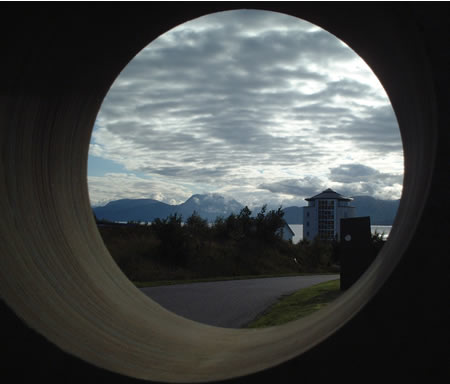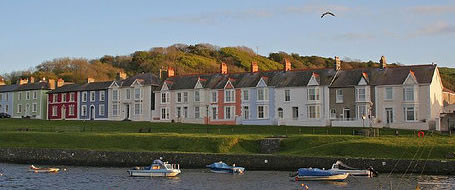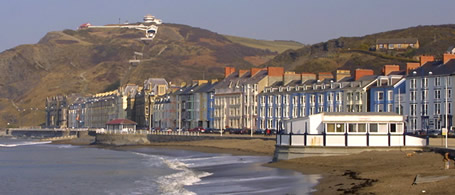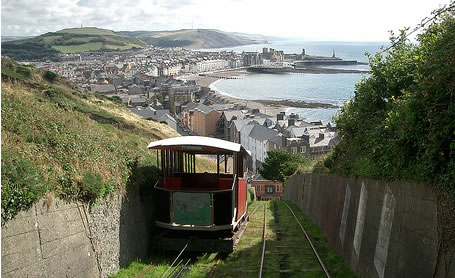I’ve now returned from my adventures in Ireland and Scotland. Well, in fact I’m currently staying with my parents in Lancashire for a few days on my way back to Bangor.

The summer school at Oideas Gael was as brilliant, and it was lovely to see so many of the people I met last year again, as well as to meet many new people. With such a gathering of friendly, interesting, talented and knowledgeable people you couldn’t help but have a great time.
I decided to go for the level 6 Irish language class rather than the level 7 one I did last year, which I found a bit too challenging and lacking in opportunities to speak Irish. The level 6 class was good fun and we all got to speak plenty of Irish. In fact I spoke Irish most of the time both inside and outside the classroom.
My Irish has now got to the level at which I can converse comfortably about everyday topics. When talking about more specialised areas my vocabulary isn’t always sufficient, but I can often find alternative ways to get across my meaning even if I don’t know the relevant words.
In the afternoons I did the sean-nós singing class with Gearóidín Bhreatnach, as I did last year, and enjoyed it immensely. We went over some of the songs we learnt last year, and learnt quite a few new ones. As well as explaining the backgrounds to the songs, Gearóidín also told us many interesting stories related to music traditions in Ireland.
A number of musicians and singers from Donegal and other parts of Ireland performed at concerts in the evenings, and I was particularly impressed by to Donegal fiddlers whose playing was outstanding. On other evenings there was story telling and a talk about the future of the Irish language. I found most of the stories quite difficult to follow, but could understand most of the talk.
After the evening concerts there were informal music sessions in the local pubs, and this year for the first time I played (the low whistle) in some of the sessions, as well as singing along with the songs I knew.
There’s a video made by one of the guys at the summer school here, and a video of Gearóidín and her daughters singing here. I even appear briefly in the first one.
After leaving Gleann Cholm Cille I travelled to Sabhal Mòr Ostaig, the Gaelic college on the Isle of Skye for a week of Gaelic Song with Christine Primrose. The journey, which lasted two days, took me through some very beautiful scenery in both Ireland and Scotland. When I arrived at the college, the sun was shining and it continued to do so for the next few days. The second half of the week was quite wet, as it was in Ireland, but this did nothing to dampen my spirits.

Sabhal Mòr Ostaig is located on the Sound of Sleat (An Linne Shlèiteach) in the south of Skye (an t-Eilean Sgitheanach) and just up the road from Armadale and Ardvasar. It has two campuses – Àrainn Ostaig and Àrainn Cholm Cille. The former is the original campus and was where I stayed. Our singing classes also took place there. The latter is a new campus just down the road with spectacular views across to the mainland. The college runs short courses during the summer in Gaelic language, music and singing, as well as a number full-time degree courses taught through the medium of Gaelic during the rest of the year.
There were 15 of us in the Gaelic song class from many countries, including Scotland, England, Wales, Ireland, Norway, Catalonia and Germany. Only three of us spoke Gaelic or had much knowledge of the language; the others found the pronunciation of the words quite tricky. Even so, in just five days we learnt over 30 songs, including waulking songs (òrain luaidh), mouth music (puirt a bheal), love songs (òrain gaoil), lullabys (talaidhean) and reels (ruidhlean). Christine, who is a great tutor, also told us the stories behind the songs, and about life on Lewis, where she grew up.
In the evenings there was more singing, and also dancing, films, a Gaelic conversation circle, and music sessions in the bar on Àrainn Ostaig. I went to some of the conversation circles and spoke a bit a Gaelic there. I also spoke Gaelic with a number of other people who were doing Gaelic classes, and with some of the tutors and staff, and realised that I can speak Gaelic reasonably well, at least at a fairly basic level. My knowledge of Irish certainly helps. I also got to speak plenty of Irish with some of the Irish speakers who were doing the Scottish Gaelic course for gaeilgeorí.



